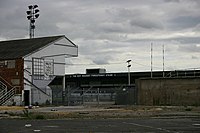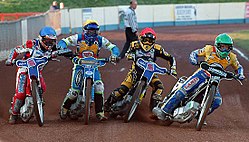Hull Vikings
 From Wikipedia the free encyclopedia
From Wikipedia the free encyclopedia
| Hull Vikings | |||||||||
|---|---|---|---|---|---|---|---|---|---|
 | |||||||||
| Club information | |||||||||
| Track address | The Boulevard Stadium and Craven Park Hull | ||||||||
| Country | England | ||||||||
| Founded | 1971 | ||||||||
| Closed | 2005 | ||||||||
| Club facts | |||||||||
| Colours | Blue and White | ||||||||
| Track size | 346 metres (378 yd) | ||||||||
| Track record time | 64.4 seconds[1] | ||||||||
| Track record date | 30 June 2004 | ||||||||
| Track record holder | Magnus Karlsson | ||||||||
| Major team honours | |||||||||
| |||||||||
The Hull Vikings were a speedway team from Hull, England, who operated from 1971 to 2005, primarily from The Boulevard (stadium) and Craven Park.[2][3]
History
[edit]Origins, 1940s and Hull Angels
[edit]Speedway in Hull began in 1948 when a corporation backed application was lodged with the Speedway Control Board. The team was managed by Fred Archer and the team wore the crest of the city's coat-of-arms (3 golden crowns on a blue shield and yellow background).[4] The team were based at Hedon Stadium in Hedon on the outskirts of Hull.[5] Their inaugural league season was in the 1948 Speedway National League Division Three where they finished 9th.[6][7]
On 27 August 1949, the Angels raced their last match at home to Liverpool Chads and then after one more away match they withdrew from the league to be replaced by Swindon Robins.[8][9] The speedway promotion applied, without success, to Hull City FC to see if they could use their old Anlaby Road ground.[10]
1970s
[edit]
In 1971, promoter Ian Thomas brought speedway back to Hull, when the Vikings began to race at the Boulevard Stadium, a 380 metres (420 yards) circumference track. The initial plan to call the team the Hull Kestrels was scrapped.[11] The Vikings raced during the 1971 British League Division Two season.[12] The Boulevard was famous as the long time home of Rugby Football League team Hull FC. During the years of racing at The Boulevard, the Vikings had the dubious distinction of being the last league speedway team ever to appear at the famous West Ham Stadium, on 23 May 1972, when they beat the closing West Ham Hammers 40–38.
After three seasons in division 2 they applied for and gained division 1 status for the 1974 British League season.[13] The team struggled from 1974 to 1977 despite riders over the four seasons including the likes of Joe Owen, Scots pair Jim McMillan and Bobby Beaton and former multiple world champion Barry Briggs. In 1978 they signed the legendary New Zealander Ivan Mauger, a five times world champion at the time and a young American rider Kelly Moran and the team finished third in the league during 1978.[14]
The Vikings just missed out on becoming British champions during the 1979 British League season, led by Mauger and with solid contributions from Beaton, Moran, Owen, Dennis Sigalos, Graham Drury and Frank Auffret, the team lost by just two point from Coventry Bees. The 1979 season also saw Mauger become the world champion for a record sixth time.[15]
1980s
[edit]A sudden decline in form and attendances during 1980 and 1981 was overshadowed when Hull FC announced that they were revoking the Boulevard's speedway licence, leaving promoters Ian Thomas and Brian Larner without a track.[16]
1990s
[edit]
In 1995, a speedway track was constructed at Craven Park, the home of the city's other rugby league team, Hull Kingston Rovers.[17] The 346 metres (378 yards) long speedway track built by Glyn Taylor ran inside the greyhound racing track. The stadium had opened only six years previous and the Vikings signed Paul Thorp and Jan Stæchmann to spearhead the team. On on 5 April 1995, the first race took place.[18]
When the Elite League was introduced in 1997, Hull chose to compete in the second tier of British speedway for the 1997 and 1998 seasons before competing in the top division during the 1999 Elite League speedway season.
2000s
[edit]Major changes took place for the 2000 season, with the Vikings choosing to drop back down to the Premier League. Paul Thorp was well supported by Garry Stead as the team competed for the league title before finally finishing 3rd. The following season the Vikings finished runner-up to Newcastle Diamonds and won the Knockout Cup.
In 2004, Paul Hodder took over the club from Nigel Wordsworth[19] and the Vikings signed Magnus Karlsson to support Thorp and Stead. The team swept the board by winning the Premier League title, Knockout Cup and Young Shield.
However, just one year later in 2005, the club were told by landords Hull Kingston Rovers that they would have to pay £75,000 in order to move the speedway track in oprder for the rugby pitch to be widened.[20] This and other financial issues ultimately resulted in the Vikings being disbanded after the 2005 season.[21]
The future
[edit]
The prospect of speedway returning to Hull would require a new venue to be built as The Boulevard was closed in 2009 and demolished, while in 2010 while Craven Park was redeveloped after the Vikings departure, with the speedway track removed and the ground becoming a rectangular sports venue suited to rugby league.
Season summary
[edit]Notable riders
[edit]References
[edit]- ^ Oakes, P (2006). Speedway Star Almanac. Pinegen Ltd. ISBN 0-9552376-1-0.
- ^ "Hull Speedway (Craven Park)". Defunct Speedway Tracks. Retrieved 25 August 2021.
- ^ "Hull Speedway (Boulevard)". Defunct Speedway Tracks. Retrieved 25 August 2021.
- ^ "Eighteen applications". Weekly Dispatch (London). 18 January 1948. Retrieved 21 September 2024 – via British Newspaper Archive.
- ^ "Hull Speedway (Hedon)". Defunct Speedway Tracks. Retrieved 25 August 2021.
- ^ "BRITISH LEAGUE TABLES – POST-WAR ERA (1946–1964)". Official British Speedway website. Retrieved 25 August 2021.
- ^ "Year by Year". Speedway Researcher. Retrieved 25 August 2021.
- ^ "1949 season" (PDF). Speedway Researcher. Retrieved 4 January 2024.
- ^ "Hull Speedway". Hull Daily Mail. 3 September 1949. Retrieved 4 January 2024 – via British Newspaper Archive.
- ^ "Grimsby will miss Hull Speedway". Grimsby Daily Telegraph. 5 September 1949. Retrieved 4 January 2024 – via British Newspaper Archive.
- ^ "Speedway team will be Hull Kestrels". Hull Daily Mail. 23 January 1971. Retrieved 4 May 2024 – via British Newspaper Archive.
- ^ Rogers, Martin (1978). The Illustrated History of Speedway. Studio Publications (Ipswich) Ltd. p. 129. ISBN 0-904584-45-3.
- ^ "Hull Vikings get division 1 status". Hull Daily Mail. 14 January 1974. Retrieved 21 September 2024 – via British Newspaper Archive.
- ^ "British League Tables – British League Era (1965–1990)". Official British Speedway website. Retrieved 25 August 2021.
- ^ Bott, Richard (1980). The Peter Collins Speedway Book No.4. Stanley Paul & Co Ltd. p. 22. ISBN 0-09-141751-1.
- ^ "Speedway battle is destined for courts". Hull Daily Mail. 17 October 1981. Retrieved 21 September 2024 – via British Newspaper Archive.
- ^ Bamford, R.; Jarvis, J. (2001). Homes of British Speedway. History Press Limited. ISBN 0-7524-2210-3.
- ^ "Vikings edge closer to the starting gates". Hull Daily Mail. 10 January 1995. Retrieved 21 September 2024 – via British Newspaper Archive.
- ^ "Hull changes hands". Crash.net. Retrieved 21 September 2024.
- ^ "Vikings' cash concerns". BBC. Retrieved 25 June 2024.
- ^ "Hull Speedway (New Craven Park)". Defunct Speedway. Retrieved 25 June 2024.

